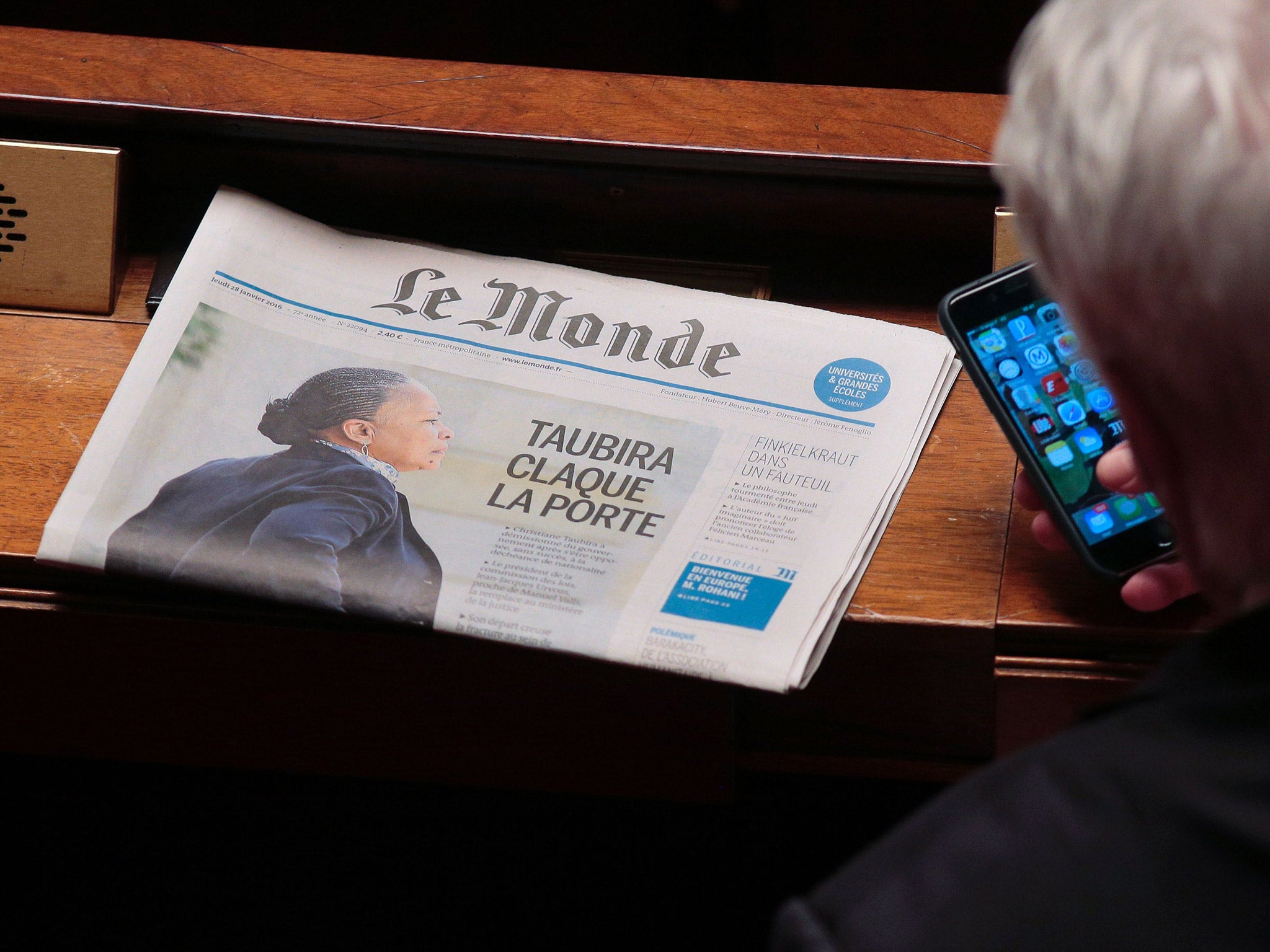Christiane Taubira resigns: Icon of the French left leaves in protest over President Hollande's plans to amend constitution in wake of Paris attacks
Departure of outspoken Justice Minister, loved by the Socialists and loathed by the far right, distances Mr Hollande still further from the grassroots of his own party - and deals blow to his already tenuous hopes of a second term

President François Hollande lost far more than his Justice Minister after her resignation. He lost a living icon of the French left and crippled his already tenuous hopes of a second term in the Elysée Palace.
Christiane Taubira – the only senior black politician in France, a lyrical defender of left-wing values and a perennial target for right-wingers and racists – resigned in protest against Mr Hollande’s plans to amend the constitution after the terrorist attacks in Paris on 13 November.
Ms Taubira, like many on the left, objects to Mr Hollande’s proposal to strip French citizenship from convicted terrorists who are dual nationals. The former Justice Minister, who has a near-religious reverence for the ideals of the French Republic, regards the proposal as a gimmick inspired by the far right that tramples on the principle that all French citizens are equal.
On Wednesday morning, she said: “Sometimes resisting means staying on; sometimes resisting means leaving.”
President Hollande insists that the change – part of a wider constitutional reform to strengthen anti-terror powers – sends a signal that France is determined to root out home-grown extremists. Critics suggest that his real motive is to disarm his right-wing opposition, rather than radical Islam.
After a series of failed attempts to reach a compromise, Mr Hollande and Ms Taubira decided last weekend that she could no longer remain in her post. The constitutional changes, which will also extend emergency powers against terrorism, go before a parliamentary committee for the first time on Thursday.
In a statement, Ms Taubira said she had “chosen to be faithful to myself, my commitments and my battles. The terrorist peril that threatens us is real but we know how to fight it. We need hand them no victories – no military ones, no diplomatic ones and no symbolic ones.”

The proposed stripping of French citizenship from convicted terrorists who have a second nationality may seem a rather abstract and obscure cause for a political crisis, but both sides argue that important principles are involved.
Mr Hollande – who once dismissed the idea – says it sends a signal that French nationality implies acceptance of core democratic values. Ms Taubira and other critics say that creating different categories of “Frenchness” is un-Republican and will increase, rather than reduce, the alienation of young French Muslims.
Ms Taubira is much loved on the left and much hated on the hard and racist right. She rose from extreme poverty in her native French Guiana to become a successful academic and then a politician.
As Justice Minister in the past four years, she has faced repeated, and mostly unjustified, allegations by right-wing politicians that she is “soft” on crime. And, as the main sponsor of a gay marriage law in 2013, she faced a barrage of racist attacks.

One right-wing magazine pictured her as a monkey on its front page. And when she visited Angers in central France in November 2013, the children of anti-gay protesters brandished “bananas for the monkey”.
Such attacks increased her popularity on the left, but her public opposition to the plan to strip dual-nationality terrorists of their French passports became an embarrassment for Mr Hollande. In a radio interview last month, she said the government was going to have to abandon the plan as “unconstitutional”.
Her departure strips the reformist government of Manuel Valls, the Prime Minister, of its last senior figure from the traditional left. She was immediately replaced by Jean-Jacques Urvoas, a relatively untried Breton Socialist and Valls loyalist.
That may be good news for Mr Valls, but it leaves Mr Hollande more than ever divorced from the grassroots of his own Socialist party and from the wider – and harder – left that he will need to seek re-election next year. He is already being urged to submit to a “primary of the left” rather than run again as a sitting President. His popularity, which rocketed after the jihadist attacks in November, has collapsed again in recent days.
Ms Taubira’s use of the word “resist” in her tweet suggests she will now join the ranks of left-wingers who have been frustrated by Mr Hollande’s failure to cut unemployment and angered by the market-opening and tax-cutting reforms of the Hollande-Valls administration.
“While Taubira was there, many people of the left could still believe this was their government,” one dissident Socialist MP said. “Now she is gone, they see no one that they can believe in.”
Reactions from other French politicians were predictably polarised. The former Culture Minister Aurélie Filippetti saluted Ms Taubira’s “immense talent”. The Green politician and former Housing Minister Cécile Duflot praised her “courage”. However, the deputy leader of the far-right Front National, Florian Phillipot, said: “The resignation of Taubira: Finally! Really good news for France.”
Join our commenting forum
Join thought-provoking conversations, follow other Independent readers and see their replies
Comments